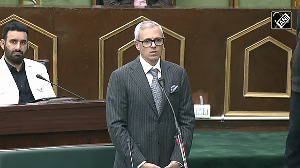Do you have financial planning queries?
Please ask your questions here and Hemant Bokil, founder, Sanay Investments, will answer them.

Kapish: Dear Hemant ji, I am 41 year old working professional and I have two kids age 7 and 2 years respectively.
I want to keep aside Rs 20 lakhs for each of them, so the money multiply around 2-3 times by the time they grow up and require it for higher education and marriage, starting 10 years from now.
Importantly, I don't want to pay yearly tax on the interest it generates as already I am in 30% slab -- a one-time long term capital gain will be ok.
Kindly suggest 2-3 options to consider.
You may consider my risk appetite as low to medium.
You can invest in index funds like HDFC Sensex Fund, UTI Nifty 50 Fund and Parag Parikh Flexi Cap Fund.
Put in a lump sum on every market dip and spread your Rs 20 lakhs over a period.
Monitor the funds and, after 10 years roughly, your money will grow well considering the way the funds are currently performing.
Anonymous: You had advised me to exit Birla Frontline (Rs 3,000 per month), HDFC Top 100 (Rs 2,000 per month), SBI Blue Chip Fund (Rs 5,000 per month), HSBC Midcap (Rs 5,000 per month), DSP Fund (Rs 5,000 per month) and add Parag Parikh Flexi Cap to my portfolio.
Please clarify the following:
(A) Will it not result in reducing the compounding effect of these funds?
(B) Should I withdraw above funds and deposit lumpsum in Parag Parikh or stop SIP of these funds and start SIP of Rs 20,000 IN PPFC?
(C) Can target of Rs 5 cr be achieved after 12 yrs?
Please reply each serial for clarity.
A. Compounding will get affected but since performance of the funds which I have advised to stop is now not good, it makes sense to stop SIP and exit when you get good profit.
B. Yes, stop SIP and exit from them.
C. With proceeds you get after selling, calculate with your CA tax payable and pay the tax. You can invest the remaining amount in PPFAS liquid fund and start STP in PPFAS Flexi Cap.
D. For Rs 5 crore to be achieved, you need to increase your SIP and/or top it with lump sum investments in MF.
Dhrubajyoti: I have earned per month Rs 30,000 but not to savings anything what to do?
Hi.
Try to save at least 25 per cent of the income. So, from your monthly income of Rs 30,000, try to save Rs 7,500.
Put Rs 2,500 per month in an overnight fund or bank RD for 12 months -- this is your emergency fund. Do this for 2 to 3 years and you can collect almost Rs 1 lakh in your emergency fund.
From the balance Rs 5,000, first buy a floater mediclaim for yourself and go for a pure term cover of at least Rs 25 lacs.
I believe after this still you can save Rs 2000 around per month; start a SIP in an index fund.
Renukadevi: Hello Investment/ Money Guru. I'm 46 years old, planning for one time investment -- Rs 8 lakhs in NPS/ Mutual/ your suggestion.
My objective to use this fund to add to my corpus during my retirement at 60 years, so 15 years I will not use this amount.
Can you please advise right investment options?
Thank you!
Hi Renukadevi.
Yes, NPS is good for investing and tax saving as per the old regime.
You can invest, say, Rs 2 lakhs in it and Rs 6 lakhs you must allocate to aggressive funds like mid cap, small cap and index funds by using a systematic transfer plan method.
Ambar: How to generate max monthly income from a corpus of Rs 40 lakhs. I am a senior citizen.
Hello, Mr Ambar.
To get max monthly income, you need to choose mutual funds.
Doing a systematic withdrawal plan in a hybrid equity fund is recommended at roughly 9 per cent per annum so you can get Rs 3.60 lakhs per annum.
If you want max income then you can think about taking a bold step and choose 12 per return but be ready to see negative capital in the short term.
(Disclaimer: This calculation is based on assumption and is not guaranteed.)
- You can ask rediffGURU Hemant Bokil your questions HERE.
Disclaimer: This article is meant for information purposes only. This article and information do not constitute a distribution, an endorsement, an investment advice, an offer to buy or sell or the solicitation of an offer to buy or sell any securities/schemes or any other financial products/investment products mentioned in this QnA or an attempt to influence the opinion or behaviour of the investors/recipients.
Any use of the information/any investment and investment related decisions of the investors/recipients are at their sole discretion and risk. Any advice herein is made on a general basis and does not take into account the specific investment objectives of the specific person or group of persons. Opinions expressed herein are subject to change without notice.











 © 2025
© 2025